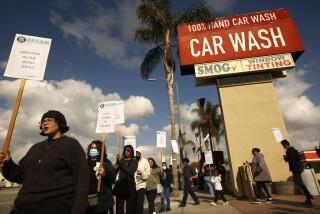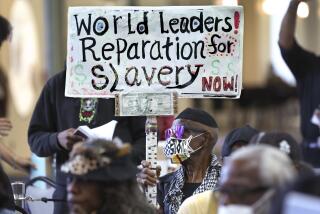Suits Against German Companies Dismissed
- Share via
A Newark, N.J., federal judge dismissed class action lawsuits Monday against two large German corporations stemming from their use of slave labor during World War II, a ruling that could make it more difficult for aging Holocaust survivors to receive substantial compensation.
In the first major ruling by a federal judge on the myriad of Holocaust-related cases filed in the past three years, U.S. District Judge Dickenson R. Debevoise said that the suits against Degussa AG and Siemens AG raised political questions that should not be resolved by a judge.
Debevoise said that treaties had been enacted to handle claims arising from World War II issues and that if he attempted to structure a reparations program it would “express the ultimate lack of respect” for U.S. government leaders who negotiated the pacts.
Judge Says Court Lacks Jurisdiction
Although he dismissed four class action suits--two against each company--Debevoise said that allegations of the companies’ complicity in barbaric acts by the Nazi regime were true. He noted that “every significant industrial concern [in Germany] participated in and no doubt profited from its role in the war effort.”
“Every human instinct yearns to remediate in some way the immeasurable wrongs inflicted upon so many millions of people by Nazi Germany so many years ago, wrongs in which corporate Germany unquestionably participated,” Debevoise wrote in his 78-page opinion. But he quickly added, “this court does not have the power to engage in such remediation.”
Later in the day, another Newark, N.J., federal district judge, Joseph A. Greenaway, dismissed a similar class action filed against Ford Motor Co. and its German subsidiary, also stemming from the use of slave labor during World War II. Attorneys for the plaintiffs said that the ruling also would be appealed.
Ford and its German subsidiary were accused of profiting from forced labor at its Cologne factory from 1941 to 1945. The suit contended that up to 50% of the workers at Ford’s Cologne plant during the war were unpaid and laboring “under utterly barbarous conditions.” Ford has maintained that the plant was under Nazi control during the war.
The rulings come just weeks before representatives of Jewish organizations and 14 large German companies, including Siemens and death gas manufacturer Degussa, are scheduled to resume negotiations on a pact over World War II slave labor claims.
Earlier this year, the German firms announced that they would create a compensation fund but thus far leaders of Jewish groups and plaintiffs’ attorneys have said the companies have been unwilling to commit to any specific amount. The companies have said they need to secure “legal closure,” meaning the end of legal threats, before any deal can be consummated.
Monday’s ruling could strengthen the firms’ leverage in those talks, although there are a number of other slave labor suits filed around the country, including one in San Francisco, utilizing the state’s unfair competition law. Gov. Gray Davis is among the plaintiffs in that case and this summer signed into law a bill sponsored by state Sen. Tom Hayden (D-Los Angeles) that grants California courts jurisdiction over claims stemming from World War II slave labor issues and extended the statute of limitations for filing such claims until 2010.
It was not immediately clear what impact Monday’s rulings would have on the California law, which clearly will face a constitutional challenge when the first case is adjudicated.
Companies to Set Up Fund
Wolfgang Gibowski, a spokesman for the consortium of 14 German firms, said he was pleased with Debevoise’s ruling but stressed that the companies are not feeling “triumphant,” and will continue with their plans to set up a “humanitarian fund.” However, he added, “maybe this decision of the court will help the plaintiffs’ lawyers to leave their unrealistic demands and expectations and we can talk about realistic figures.”
A representative of the companies said that the attorneys had suggested $20 billion as an appropriate figure for a settlement during negotiations in Germany in August. Washington attorney Michael Hausfeld, one of the plaintiffs’ attorneys, said that about 2.4 million people are entitled to compensation, but he declined to state how much they ought to receive.
Hausfeld said the companies ought to be shamed into paying because of the judge’s comments that they clearly had profited from their involvement in the horrors of the Nazi regime. Degussa manufactured Zyklon B, the chemical used in the German gas chambers. Degussa also refined gold, including dental fillings, for the German authorities that was seized from Jews at the Nazi death camps. In addition, both companies made extensive use of slave laborers. Siemens is now a multinational corporation in fields including electronics and Degussa is a chemical and precious metal processor.
Debevoise said, that “the firms using slave laborers must have known the origin of these workers. Degussa must have known the use to which its Zyklon B was being put and the sources of the gold it was refining for the German authorities.”
Nonetheless, the judge said that the victims are barred from suing in the United States under the last treaty that dealt with reparations, the Transition Agreement of 1954.
A trio of plaintiffs lawyers, including New York University law professor Burt Neuborne and class action specialists Melvyn I. Weiss and Deborah Sturman, issued a statement saying that the ruling would be appealed. Neuborne maintained that the intent of the 1954 treaty was to postpone, not to extinguish, such claims during the period that the ravaged German economy was being rebuilt.
“While the appeal is pending it is the duty of the State Department, and the Congress, to assure that Germany respects the treaty obligation recognized by Judge Debevoise to compensate slave laborers in accordance with its ability to pay.”
Washington attorney Peter Heidenberger, who represented the German government, which had urged dismissal of the case, said he was pleased with the ruling. So was Thomas D. Yannucci, an attorney for Siemens. Yannucci said the company already has compensated a number of former slave laborers and would continue to do so. “Siemens regrets the practices that occurred during World War II,” he said.
Degussa issued a statement saying that the ruling accepted the German companies’ position that reparations matters should be resolved by the U.S. and German governments.
Ford spokeswoman Lydia Cisaruk said Monday that Greenaway’s decision vindicated the company’s position that “the issues presented in the lawsuit are more appropriately addressed through government-to-government negotiations. The dismissal of this lawsuit should accelerate governmental efforts to provide relief to those who were exploited by the Nazi regime.”
A State Department spokesman said attorneys there were reviewing the rulings and would have no immediate comment. Stuart Eizenstat, deputy Secretary of the Treasury, who is the point person for the Clinton administration on Holocaust matters, was unavailable for comment. He has been attempting to forge an out-of-court settlement and has said that it ought to be in the range of $8 billion to $9 billion.
More to Read
Inside the business of entertainment
The Wide Shot brings you news, analysis and insights on everything from streaming wars to production — and what it all means for the future.
You may occasionally receive promotional content from the Los Angeles Times.










